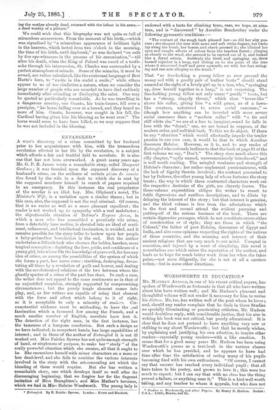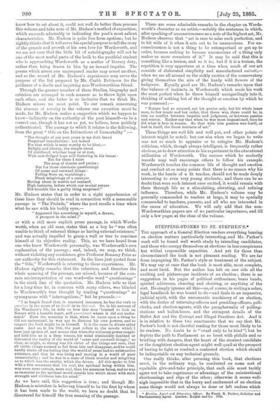WORDSWORTH IN EDUCATION.*
MR. MATTHEW ARNOLD, in one of his recent critical papers, has spoken of Wordsworth as fortunate in that all who have written about him have written well ; and Mr. Hudson's pleasant and thoughtful volume will not render it necessary for him to revise his dictum. He, too, has written well of the poet whom he loves ; and, should any reader complain that he finds in these Studies no specially illuminating or penetrating criticism, Mr. Hudson would doubtless reply, with considerable justice, that his aim in writing his book was not critical, but purely educational. It is clear that he does not pretend to have anything very new or striking to say about Wordsworth ; but that he merely wishes, by explaining and justifying his own affection, to inspire other readers—especially young readers—with a like emotion. It seems that for a good many years Mr. Hudson has been using Wordsworth's poems as a text-book in the various classes over which he has presided, and he appears to have had time after time the satisfaction of seeing many of his pupils becoming fired with his own enthusiasm. "Of course, I cannot Bay that success has reached every individual pupil ; that all have taken to his poetry, and grown to love it ; this were too much to expect : but I can say that with no class has the thing proved a failure, or anything near it." This is a hint well worth taking, and any teacher to whom it appeals, but who does not * Studies in Wordsworth, and other Papers. By Henry N. Hudson. Boston : U.S.A.: Little, Brown, and Co.
know how to set about it, could not well do better than, procure this volume and take note of Mr. Hudson's method of exposition, which succeeds admirably in indicating the poet's most salient characteristics. Mr. Hudson is quite free from egotism; but he rightly thinks that it will serve his special purpose to tell the story of the genesis and growth of his own love for Wordsworth, and we are not sure that the little bit of autobiography will not be one of the most useful parts of the boar to the youthful student who is approaching Wordsworth as a matter of literary duty, rather than being drawn to him by an inward impulse. The poems which arrest one unprepared reader may arrest another, and so the record of Mr. Hudson's experiences may serve the purpose of the list prepared by Mr. Crabb Robinson for the guidance of a docile and inquiring non-Wordsworthian friend.
Through the greater number of these Studies, biography and criticism are arranged in such manner as to throw light upon each other, and the latter is so inclusive that we think Mr. Hudson misses no moot point. To our remark concerning the absence of novelty in the volume one exception must be made, for Mr. Hudson makes a suggestion which we happen to know—indirectly on the authority of the poet himself—to be a correct one, though it has not as yet, we believe, been publicly authenticated. The passage to which it relates is the following, from the great" Ode on the Intimations of Immortality" :— " The thought of our past years in me doth breed Perpetual benedictions : not indeed
For that which is most worthy to be blest,— Delight and liberty, the simple creed Of childhood, whether busy or at rest, With new-fledged hope still fluttering in his breast : Not for these I raise The song of thanks and praise ; But for those obstinate questionings Of sense and outward things : Falling from us, vanishings ; Blank misgivings of a creature Moving about in worlds not realised,
High instincts, before which our mortal nature Did tremble like a guilty thing surprised."
Mr. Hudson states that in order to a right apprehension of these lines they should be read in connection with a memorable passage in "The Prelude," where the poet recalls a time when what he saw with his bodily eyes,—
" Appeared like something in myself, a dream, A prospect in the mind ;" or with a still more explicit prose passage, in which Words- worth, when an old man, states that as a boy he "was often unable to think of external things as having external existence," and was actually impelled to grasp a wall or tree to convince himself of its objective reality. This, as we have heard from one who knew Wordsworth personally, was Wordsworth's own explanation of the passage ; and, indeed, we may, we think, without violating any confidence, give Professor Bonamy Price as our authority for this statement. In the lines just quoted from the "Ode," Wordsworth is referring to these experiences. Mr. Hudson rightly remarks that the reference, and therefore the whole meaning of the passage, are missed, because of the com- mon misinterpretation of one word—the word " questionings " in the ninth line of the quotation. Mr. Hudson tells us that for a long time he, in common with many others, was blinded to Wordsworth's true thought by reading "questionings" as synonymous with "interrogations ;" but he proceeds :— " I at length found that, in repeated instances, he has the verb to question in the sense of to doubt or to distrust. So, in his account of the Wanderer's life, he tells us how this man `learned to look on Nature with a humble heart, self-questioned where it did not under- stand.' Here the meaning is that, when he came upon a thing he .did not understand, be was apt to distrust his own powers, and to suspect the fault might be in himself. It is the same in divers other cases. And so, in his Ode, the poet refers to the moods which I have just spoken of, and means that when the visionary power caught and held him as in a deep trance, his mind obstinately doubted or distrusted the reality of the world of 'sense and outward things ;' so clear, so bright, so strong was his vision of the things not seen, that all visible things seemed to fall from him and disappear, and he could hardly shake off the feeling that the world of sense had no substantive existence, and that he was living and moving in a world of pure immateriality ; and he was in a state of blank wonder and misgiving as to which was the reality, which the dream. All this spoke to him with a firm assurance that his soul, the spiritual being within him, was even more certain, more real, than his sensuous being, and so was as immortal as the spiritual world outside him which shone with such strength and vividness into his mind."
As we have said, this suggestion is true ; and though Mr. Hudson is mistaken in believing himself to be the first by whom it has been made to the world, we have no doubt that he .discovered for himself the true meaning of the passage. There are some admirable remarks in the chapter on Words- worth's character as an artist—notably the sentences in which, after speaking of unconsciousness as a note of the highest art, Mr.
Hudson observes that "art is sure to miss such perfection, and to hit wide of it when it sets out to be unconscious. For un- consciousness is not a thing to be extemporised or got up to order, because seeking to become unconscious of a thing only makes us more conscious of it." It may be said that this is something like a truism, and so it is ; but if it is a truism, the repetition is very opportune at a time when much of our art
consists of elaborated simplicity and manufactured naivete,— when we see all around us the sickly exotics of the conservatory giving themselves the airs of the hardy wild flowers of the hedgerow. Equally good are Mr. Hudson's remarks upon that fine balance of instincts in Wordsworth which made his work the most perfect when he threw himself unregardingly into it,
thinking of nothing but of the thought or emotion by which he was possessed :—
"Nature had so attuned, not his genius only, but his whole inner man, to her music and her order, that there was, there could be, in him no conflict between impulse and judgment, or between passion and reason. Rather say that when he was most impassioned, then he did what is best in reason. So that with him passion was itself, or had in itself, the finest instincts of art."
These things are well felt and well put, and other points of interest might be noted; but our aim when we began to write was not so much to appraise or to eulogise Mr. Hudson's criticism, which, though always intelligent, is frequently rather obvious, as to draw attention to his experiment in the educational utilisation of Wordsworth. The success which he modestly records may well encourage others to follow his example. Wordsworth touches the common life of thought and emotion and conduct at so many points that there is no reason why his work, in the hands of a fit teacher, should not be made deeply interesting to even very young students ; and there can be no doubt that were such interest once excited, it would remain with them through life as a stimulating, elevating, and refining influence. Therefore, while Mr. Hudson's volume may be generally commended to readers at large, it may be specially commended to teachers, parents, and all who are interested in the cause of education. We will only add that the non- Wordsworthian papers are of ho particular importance, and fill only a few pages at the close of the volume.



































 Previous page
Previous page